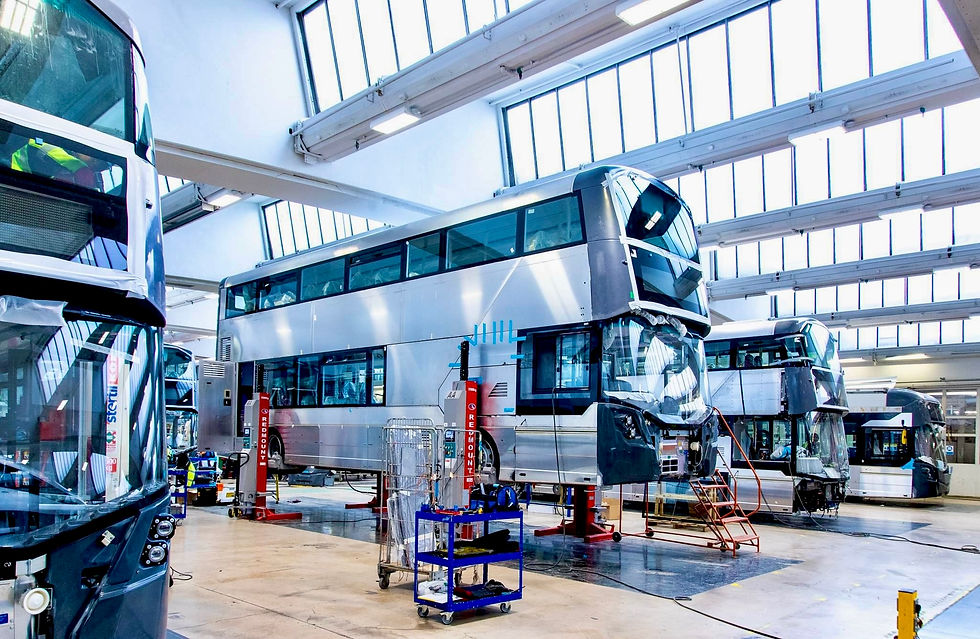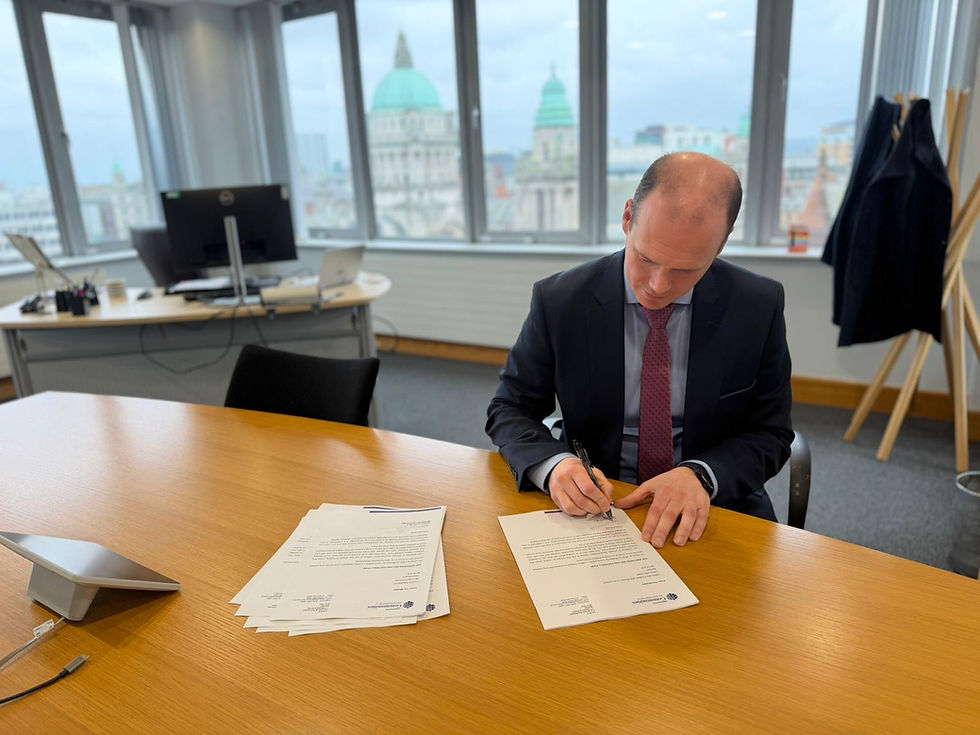Frew presses UK Government to defend Wrightbus amid growing fears over unfair competition from China
- Love Ballymena

- Sep 22, 2025
- 4 min read

Wrightbus chief executive Jean-Marc Gales
North Antrim DUP MLA Paul Frew has escalated calls for urgent government action to safeguard Wrightbus, warning that the Ballymena-based manufacturer is being left exposed to unfair competition at home and abroad.
In a letter to the Secretary of State for Northern Ireland, Mr Frew demanded a “level playing field” for the company, which is not only North Antrim’s largest single employer but also one of the fastest-growing manufacturing contributors to GDP across the UK.
“Wrightbus is North Antrim’s largest single employer and in the top ten in NI,” Mr Frew said.
“In terms of GDP it is the fastest growing manufacturing contribution to GDP across the UK. Wrightbus has received very little support from Government and yet leads the research and development in this field by some margin.
“The company needs, and I demand, a level playing field – not one where domestic competitors are given unfair government support or where international competitors can come and compete with greater support from their home states whilst our Government burdens our companies more with a hike in employers’ national insurance contributions.”
He stressed that successive decisions from Westminster risk undermining Northern Ireland’s industrial base:
“I need to ensure that the Secretary of State for Northern Ireland actually steps up and defends Northern Ireland, North Antrim and the businesses and employees within.”
Wrightbus at the heart of Northern Ireland’s economy

Wrightbus employs around 2,300 people and is a key driver of innovation in clean transport technology. The company, which designs and manufactures zero-emission buses, was rescued from administration in 2019 by Jo Bamford, son of JCB chairman Lord Bamford, after intervention from local political figures including the former North Antrim MP Ian Paisley.
Since then, the company has transformed itself into a global leader in electric double-decker buses, expanding exports and becoming Europe’s fastest-growing bus manufacturer. Annual revenues are expected to reach £600 million in 2025, more than three times the level achieved in 2022.
But Mr Frew and Wrightbus executives have warned that continued growth is not guaranteed without stronger UK Government backing.
Gales: “How long can we win?”

Wrightbus chief executive Jean-Marc Gales
Wrightbus chief executive Jean-Marc Gales, a veteran of the European automotive industry, told the Sunday Telegraph (source) that Chinese manufacturers such as BYD and Yutong posed a major threat due to “huge state subsidies” provided by Beijing.
“What we want is a level playing field, not one where competitors from a particular country get better conditions than all of the others,” he said. “That does not mean protectionism, but it does mean support. We’re one of the only countries that doesn’t support its own industry in terms of buses.”
He pointed to France, where 45 per cent of all bus components are required to be sourced from within Europe, as an example of how domestic industries are shielded. “How about a 40 per cent UK content to protect this industry? But we never do,” he said.
Although Wrightbus has successfully overtaken Chinese rivals in the electric double-decker market, Mr Gales warned that its progress could stall:
“We can become a world champion for Britain in electric buses. We’ve shown with double-deckers that we can do it. BYD are a giant and we have taken that crown. But if people are going to take you seriously as an exporter you have to be number one at home. And if there is unfair competition, how long can we win?”
Lack of government backing
Mr Gales said funding schemes that once encouraged UK bus operators and councils to purchase from Wrightbus have “all but dried up”, leaving the company exposed to foreign competitors.
Current programmes exclude the retrofitting of diesel fleets to run on batteries – a gap he warned deprives Wrightbus of sales and denies councils one of the most affordable routes to cutting carbon emissions.
“We talk with them [government ministers] all the time. They listen and they acknowledge, but so far nothing more. We hope that very soon there is another programme because we are ready,” Mr Gales said.
He emphasised that without a strong home market, Wrightbus could struggle to sustain its export ambitions in markets such as Singapore, Hong Kong and Australia.
The wider picture
Mr Frew’s intervention highlights growing political pressure on Westminster to reconsider how it supports domestic industry in the face of aggressive global competition.
For Northern Ireland, the stakes are particularly high: Wrightbus is both a cornerstone employer in Ballymena and a showcase for advanced manufacturing capabilities in the UK.
With Mr Bamford targeting £1 billion in annual revenues, Wrightbus has the potential to become one of Britain’s most successful industrial exporters. But both Mr Frew and Mr Gales argue that government must match the ambition shown by the company and its workforce.
As Mr Frew put it:
“Wrightbus has gone from strength to strength since Joe Bamford came in and invested in the company… This kept the company in existence, building back up the employment levels to where we are today. But now we need to see Government step up as well.”








